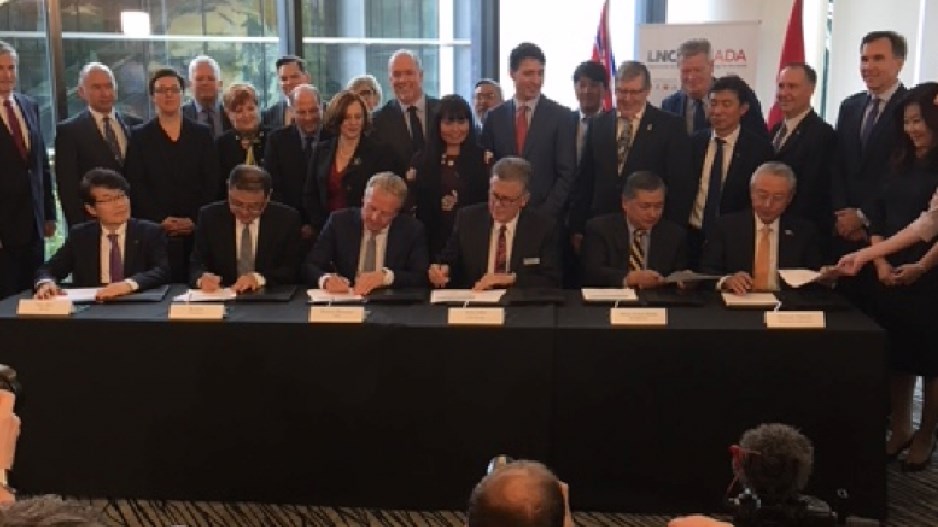The $40 billion LNG Canada project, formally sanctioned at a signing ceremony in Vancouver Tuesday October 2, represents “the single largest private sector investment in the history of Canada,” said Prime Minister Justin Trudeau.
See also: LNG Canada project is a go
And in case anyone missed it, Trudeau repeated the phrase three more times. B.C. Premier John Horgan repeated it twice.
The long-awaited “unconditional” final investment decision on the liquefied natural gas plant in Kitimat and Coastal GasLink natural gas pipeline was announced late Monday night.
Executives from LNG Canada’s five joint venture partners – Royal Dutch Shell, Petronas, PetroChina, Mitsubishi and Korea Gas – were on hand to officially sign a final investment decision agreement at a press conference in Vancouver Tuesday.
“LNG Canada is immediately today moving into construction,” said LNG Canada CEO Andy Calitz.
The announcement of LNG Canada getting a final investment decision marks two back-to-back wins for Trudeau, whose government just yesterday successfully inked a renegotiated North American Free Trade Agreement.
“Similar to our great news on trade yesterday, today is a great day,” Trudeau said.
The FID is a win for the Horgan government, as well, which has been characterized as chasing away large energy projects, like the Pacific NorthWest LNG project, which was cancelled not long after NDP government took power.
“It validates the reality that, in B.C., projects can be done if it is done in the right way,” Calitz said.
In a show of non-partisan unity, Liberal Party Leader Andrew Wilkinson, Liberal MLA Ellis Ross and former Liberal Natural Gas minister Rich Coleman were invited to Tuesday’s signing ceremony, and Horgan singled out Coleman and Ross for their efforts to develop an LNG industry in B.C.
“In recent years, Rich Coleman worked tirelessly to get a final investment decision here in British Columbia,” Horgan said. “This is not about one government. This is not about one person. This is about a commitment from the people of British Columbia, to our resources, and to do what we can to make life better for British Columbia.”
Special credit was also given to the Haisla First Nation for its strong support for the LNG industry. Haisla Chief Crystal Smith said her people’s involvement in the project means that “we are having a share and we are having a say.”
The project will result in $23 billion in spending in B.C., and generate roughly 10,000 construction jobs over a five-year period. The plant is expected to be completed around 2025.
Green Party Leader Andrew Weaver, who was not at Tuesday’s ceremony, has said he cannot support the project, and has stated he does not think that B.C. can meet its climate change commitments while developing an LNG industry.
Asked about Weaver’s opposition, Horgan said: “He has some concerns about this project. I do not.”
“The challenge now for the prime minister and I, and all policy makers, is to ensure that we can fit the emission profile of this project within a robust and aggressive climate action plan that will meet not just the needs of British Columbians but, in fact, the world, and I believe we can do that,” Horgan said.
Trudeau said that the LNG Canada plant will have “the lowest carbon intensity of any large scale facility in the world.”
And because natural gas produces about half the carbon emissions that coal does, exporting LNG to displace coal power means there is a net benefit, Trudeau said.
“By sending Canadian LNG to markets that are today powered by coal we will help those jurisdictions transition out away from this energy source,” Trudeau said.




